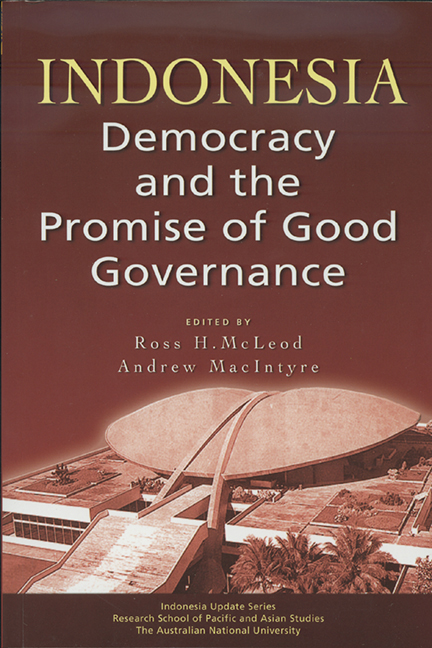Book contents
- Frontmatter
- Contents
- List of Tables and Figures
- List of Contributors
- Acknowledgments
- Glossary
- 1 Introduction
- PART I FORMING AND REFORMING THE ARCHITECTURE of GOVERNANCE
- PART II THE ROLES OF GOVERNMENT
- PART III THE INSTITUTIONS OF GOVERNMENT
- 9 The Civil Service: Towards Efficiency, Effectiveness and Honesty
- 10 The Constitutional Court–s Decision in the Dispute between the Supreme Court and the Judicial Commission: Banishing Judicial Accountability?
- Index
- INDONESIA UPDATE SERIES
10 - The Constitutional Court–s Decision in the Dispute between the Supreme Court and the Judicial Commission: Banishing Judicial Accountability?
from PART III - THE INSTITUTIONS OF GOVERNMENT
Published online by Cambridge University Press: 21 October 2015
- Frontmatter
- Contents
- List of Tables and Figures
- List of Contributors
- Acknowledgments
- Glossary
- 1 Introduction
- PART I FORMING AND REFORMING THE ARCHITECTURE of GOVERNANCE
- PART II THE ROLES OF GOVERNMENT
- PART III THE INSTITUTIONS OF GOVERNMENT
- 9 The Civil Service: Towards Efficiency, Effectiveness and Honesty
- 10 The Constitutional Court–s Decision in the Dispute between the Supreme Court and the Judicial Commission: Banishing Judicial Accountability?
- Index
- INDONESIA UPDATE SERIES
Summary
This chapter discusses Indonesia's main recent judicial reforms, particularly those that appear to have been designed to increase judicial independence and judicial accountability, and the teetering balance that had been struck at the time of writing. I will focus on three institutions– the Constitutional Court (Mahkamah Konstitusi), the Supreme Court (Mahkamah Agung) and the Judicial Commission (Komisi Yudisial)– and the dispute in which they were involved for much of 2006.
The United Nations' basic principles on the independence of the judiciary (UN 1985) require governments to provide conditions that enable judges to decide cases impartially, that is, ‘without any restrictions, improper influences, inducements, pressures, threats or interferences, direct or indirect, from any quarter or for any reason’ (article 2). Judicial independence requires that ‘the term of office of judges, their independence, security, adequate remuneration, conditions of service, pensions and the age of retirement … be adequately secured by law’ (article 11). The principles also require that judges be immune from civil suits for ‘improper acts or omissions in the exercise of their judicial functions’ and that their decisions not be ‘subject to revision’ (article 16). Moreover, judicial independence permits judges to be removed from office before their term has expired only for conduct that is inconsistent with their role as a judge (such as a serious criminal conviction) or that indicates that they are incapable of continuing in office (such as incompetence or illness) (article 18; see also Volcansek 1996: 9).
Judicial independence is often justified on the basis that an impartial third party is necessary to resolve disputes between individuals, entities and governments that they cannot resolve themselves (Shapiro 1981: 1, 7). If judges are not independent, then the public is unlikely to have confidence in the courts, and such confidence is essential to a legal system that depends for its effectiveness on voluntary compliance with judicial decisions (Holland and Gray 2000: 117). Moreover, many scholars accept that judicial independence is crucial to a functioning democracy, the rule of law and human rights protection. Hirschl notes the ‘growing acceptance and enforcement of the idea that democracy is not the same thing as majority rule’ and that minorities must be protected by a bill of rights, enforced by judges ‘removed from the pressures of partisan politics’ (Hirschl 2004: 1–2; see also Ginsburg 2003: 2, 96).
- Type
- Chapter
- Information
- IndonesiaDemocracy and the Promise of Good Governance, pp. 178 - 200Publisher: ISEAS–Yusof Ishak InstitutePrint publication year: 2007



